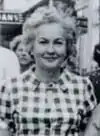Sybil Gibson | |
|---|---|
 | |
| Born | Sybil Aaron February 18, 1908 |
| Died | January 2, 1995 (aged 86) |
| Nationality | American |
| Known for | Painting |
| Movement | Outsider art, folk art, naive, self-taught |
| Spouse(s) | Hugh Gibson (m. 1929–1935; divorce), David DeYarmon (m. c. 1950–1958; death) |
Sybil Gibson (née Sybil Aaron; February 18, 1908 – January 2, 1995)[1] was an American painter, she was self taught artist.
Early life and education
Born Sybil Aaron in Dora, Alabama, to parents Lenora Reid Aaron and Monroe Aaron.[2][1] Her father was a wealthy coal mine owner and farmer, he owned and operated the Sulphur Springs Coal Company.[3] She was one of eight children.[2]
She was educated at Jacksonville State Teachers College, earning a B.S. in Elementary Education, before going on to become a teacher.[4]
Career
For much of her adult life she had no interest in painting, having had her ambitions crushed when a college art teacher told her she had no talent.[5] However, on Thanksgiving Day 1963, aged 55, Gibson took to creating her own wrapping paper designs using tempera paint and brown paper grocery bags. This led to a fascination with creating art which lasted until her death.[6]
Howell Raines wrote in June 1971 that "the paintings are not over-powering, they are truly fragile in the best sense. The colors are very delicate, and while Sybil Gibson's work is figurative, her realism is tempered with a certain dream-like quality."[7] Gibson chose to paint limited subject matter - mainly concentrating on the human form, particularly faces, as well as flowers, birds and small animals[8] Her style is considered 'folk art', and she is regarded as an outsider, or naïve artist.[4]
In May 1971, shortly before the opening of her first art exhibition, at the Miami Museum of Modern Art, Gibson disappeared, leaving drawings strewn about her yard.[9] An eccentric woman, Gibson disappeared several times.[6] Around 300 of her paintings are believed to exist in museums and private collections, although many more have been destroyed after being strewn around outside her home when she disappeared.[6]
Gibson's work has been exhibited in more than fifty one-woman exhibitions.[10] Her work is featured in various public museum collections including at the Montgomery Museum of Fine Arts;[2] the Museum of American Folk Art;[11] the Johnson Collection;[12] Birmingham Museum of Art,[13] and the New Orleans Museum of Art.[14]
Personal life and death
She married her high school boyfriend Hugh Gibson in 1929, with whom she raised a daughter.[2] By 1935, she was divorced from Gibson and her parents were caring for her daughter while she went back to school.[2] Despite her prosperous upbringing, she spent much of her adult life living in poverty.[9]
In the late 1940s she moved to Florida due to a sinus issue.[2]
From c. 1950 to 1958, she was married to David DeYarmon, the marriage ended when he died.[2]
Late in life her daughter arranged for Gibson to return to Florida, where she had an operation to restore her sight.[2] She died on January 2, 1995, in Dunedin, Florida, aged 86.[2]
References
- 1 2 Hood, John (2013). "Gibson, Sybil". The New Encyclopedia of Southern Culture: Volume 23: Folk Art. University of North Carolina Press. pp. 289–290. ISBN 978-0-8078-3442-8. JSTOR 10.5149/9781469607993_crown.130.
- 1 2 3 4 5 6 7 8 9 Bullock, Margaret (October 24, 1996). "Sybil Gibson". Montgomery Museum of Fine Arts (MMFA). Retrieved 2022-05-02.
- ↑ Blokhuis-Mulder, Jantje. "Faces are the Mirror to the Soul: The Folk Art of Sybil Gibson". Folkartlife.com. Archived from the original on 2015-12-29. Retrieved 2019-06-07.
- 1 2 "Sybil Gibson". Ask Art. Archived from the original on 2011-05-25. Retrieved 2007-12-23.
- ↑ "Sybil Gibson - Biography". Mich Barnes - Redkettle Art and Collectibles. Archived from the original on 2007-10-24. Retrieved 2007-12-23.
- 1 2 3 "Sybil Gibson". Marcia Weber Art Objects. Archived from the original on 2007-10-21. Retrieved 2007-12-23.
- ↑ Howell Raines (1971-06-20). "Here she is, Miami Herald, in Birmingham". The Birmingham News. p. E1.
- ↑ "Sybil Gibson (1908–1995)". Robert Cargo Folk Art Gallery. Archived from the original on 2008-01-28. Retrieved 2007-12-23.
- 1 2 Doran, Anne (2018-01-19). "Masterpieces from the Margins: The Outsider Art Fair Triumphs in New York". ARTnews. Archived from the original on 2019-03-22. Retrieved 2019-06-07.
- ↑ "Sybil Gibson". Ginger Young Gallery. Archived from the original on December 17, 2007. Retrieved 2007-12-23.
- ↑ "Abstract with Three Faces". American Folk Art Museum. 1993.
- ↑ "Index of Women Artists". The Johnson Collection, LLC. Retrieved 2022-05-02.
- ↑ "Untitled, Sybil Gibson". Birmingham Museum of Art. 2022-04-13. Retrieved 2022-05-02.
- ↑ "Portrait of a Woman by Sybil Gibson - intuitive eye". intuitiveeye.org. Archived from the original on 2016-10-28. Retrieved 2017-03-25.